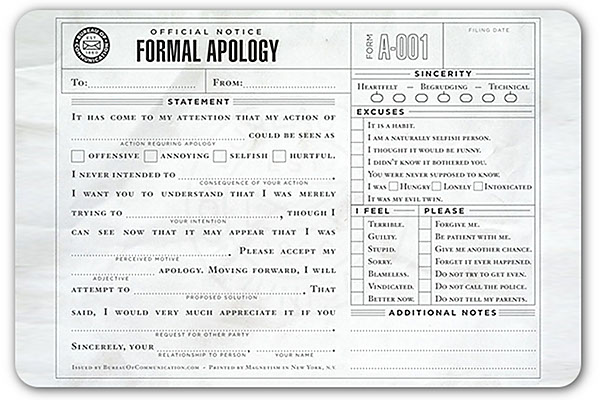


Saying You’re Sorry
From Rick Seltzer, writing in Inside Higher Ed:
For college and university presidents, the process of apologizing after high-profile missteps can seem to take as long as a tortoise walking a mile.
As a result, the actions Wednesday of University of California, Irvine, Chancellor Howard Gillman stand out as noteworthy. Days after news broke that the university revoked admission offers from 499 students, Chancellor Howard Gillman issued a public statement offering a personal apology. The university would admit all accepted students except for those who dropped below its academic standards, he said.
The relative speed and decisiveness with which Gillman acted raise the question of why more university presidents don’t step in so swiftly. Higher education’s recent history is littered with instances of leaders who seemingly hesitated to offer forceful apologies. Instead of pleasing the public by uttering two little words and a promise to fix things, such presidents have been seen as incompetent, stonewalling or hemming and hawing.
For presidents, however, apologizing isn’t as simple as saying “I’m sorry.” At a complex institution like a college or university, a sincere apology can only come after a process of gathering information and weighing risks to the institution, according to experts who have been in crisis war rooms. That process is under strain in a world where rapid societal changes collide on college campuses and where students have a louder voice than ever because of social media.
And then there is the human element. Sometimes, highly successful leaders have a difficult time looking beyond their tried-and-true playbooks, which might not apply to a particular situation and might not include apologizing. Other times, top brass can’t look beyond their own ego.
Many of those factors don’t appear to have applied to Irvine’s admissions situation, of course. The university was the subject of a July 28 Los Angeles Times article describing soon-to-be freshmen who had been planning to attend its campus only to have their admission offers yanked two months before the fall semester started. More than half of the offers had been rescinded due to transcript issues, and the others had been revoked for poor grades during students’ senior years.
Colleges and universities sometimes revoke admission offers over the summer in cases where students don’t file required paperwork on time, pay deposits or keep up their grades as they finish high school. But 499 revocations was unusually high for a UC institution. And a university spokesman confirmed that UC Irvine had been stricter than usual with its requirements — at the same time that more students than expected had accepted its offers of admission.
The university had been anticipating 6,300 freshmen. About 7,100 accepted offers.
To read the rest, click here.